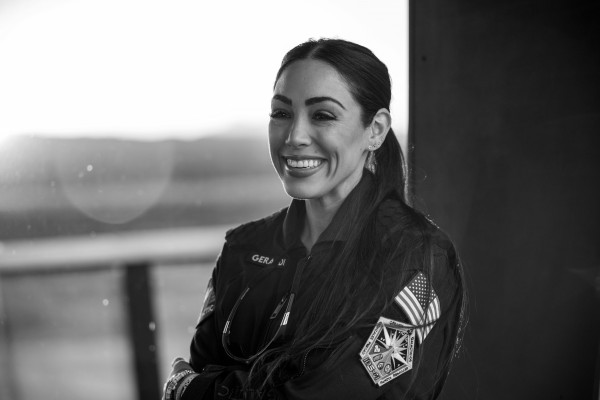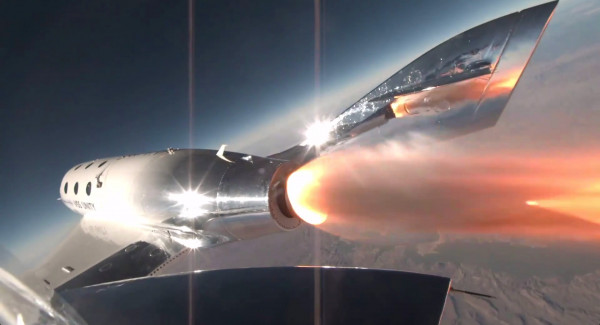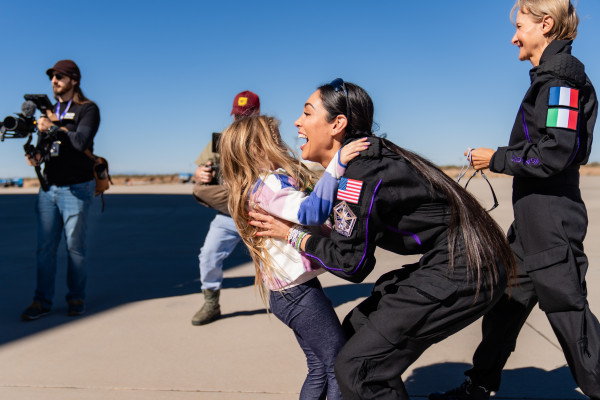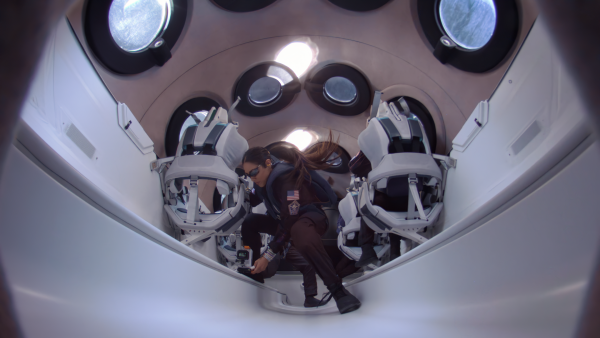Out Of This World

While nearly 600 men have spent time in space, less than 100 women have successfully done so. Recently the 90th female entered space, and did so wearing Taylor-Swift Era’s Tour friendship bracelets on her first suborbital mission. Meet Kellie Gerardi, the 34 year old American space explorer inspiring young women around the globe to challenge gender roles and remind the world that glamour can coexist with the space industry.
Kellie, let me start off by saying you're amazing... What's it like being a woman in space in 2024?
It feels incredible. Just to put things in perspective about the moment that we’re at right now, in the entirety of our history as a space-faring species, only a few hundred people have been to space, and fewer than 100 have been women. In November of last year, I flew to space as a payload specialist on the Galactic 05 research mission and became the 90th woman in history to fly to space, which I think drives home that the limiter to human spaceflight has always been access, and not aptitude. That’s changing, and this is just the beginning. I'm excited about access to space continuing to increase, not only for researchers like myself, but for civilians of all disciplines.

Can you describe the feeling when you're up there looking back down at Earth?
I felt incredibly well-trained and knew exactly what to expect during my spaceflight, but in hindsight, I realized nothing could have truly prepared me for the profundity of seeing planet Earth with my own eyes. I was in absolute awe. We’ve all seen pictures of the Earth from space, and many from much further away than I was, but the difference for me was truly experiencing it as a planet among other planets. I’ll never forget it. Carl Sagan’s reflections were front of mind for me when I was able to look back at our home planet: it hit me that I was looking at everything I’ve ever known or loved, every human who has ever lived. If I’m honest, I’m still processing it. I don’t know that I’ll ever quite find the words to do it justice. It was an intensely emotional experience and that emotional saturation has continued for weeks after. I truly believe so many of our problems could be solved if more leaders could have this perspective. I hope that’s in our future.
What do you love most about your job?
Training for space was really wonderful. Flying to space has been a lifelong dream, and I've had many years of experience conducting research in microgravity here on Earth thanks to parabolic flight campaigns. To prepare for space itself, I like to joke that I upped my dose of Vitamin G! I had to carefully choreograph my movements in the cabin down to the second, and I practiced and perfected that choreography across a series of aerobatic (high-g) and parabolic (zero-g) flights to make sure everything integrated and operated as intended. This helped inform ideal sensor placement on my experiments and helped validate our choreography plan. Practice makes perfect! And then, of course, I had plenty of vehicle-specific training and payload integration work with the Virgin Galactic team. Because this was a dedicated research mission, my flight involved different training and additional safety and operational protocols than a tourist flight.
How many times do you intend to go back up?
The Galactic 05 research mission was my first spaceflight, but I'm hopeful that this is only the beginning. I do expect to have another opportunity to fly again, but my goal was always so much bigger than flying myself. I began my career with the dream of helping blow open the door to commercial human spaceflight. It's surreal I was able to walk (float?) through that door as an astronaut myself, but the real goal is holding it open for the next generation of researchers and civilians who will follow... ensuring space is a laboratory to benefit humanity. There’s a tidal wave of scientific research that can benefit from accessible, responsive platforms like Virgin Galactic. We have an entire community of scientists and experiments ready to use space as a laboratory to benefit humanity, and I’m excited to focus my attention on enabling those next flights.
We love how you're paving a way for women in space but also expressing your love of glam. You had full glam H&M and accessories on your suborbital mission (mad respect for that). Why do you think people don't generally assume they can't exist in the same realm?
While I packed a number of personal mementos for space, the most notable thing was probably a stack of friendship bracelets that I wore proudly on my wrist! It felt special to be flying to space in the same year as the Eras Tour (and the Barbie movie! and the Renaissance tour!) and as I was preparing for my flight I kept reflecting on how few women we’ve seen in these roles. It was really important to me to not tone down my personality or femininity in an attempt to match a picture of what someone else thought a woman in STEM should look like — I wanted to bring my full self to space and show my daughter that being yourself is always enough. Doing science in space with a wrist full of friendship bracelets was the perfect way for me to pay homage to a year dominated by girl power. I had a small army of girlfriends cheering me on back on Earth at the Spaceport, and we exchanged friendship bracelets right after my flight.

You have a young daughter, how do you balance your work life with motherhood?
The most rewarding aspect of my journey has been experiencing it through the eyes of my six year old daughter, Delta. We’ve had fewer than 100 female astronauts, but in Delta’s mind, flying to space is just another thing moms do! She’s going to grow up knowing that not even the sky is a limit. It’s also been a powerful reminder of how much can change in a single generation. When my mom was born, humans hadn't yet been to space. And when she was growing up, women weren't eligible. Just one generation later, she watched her daughter reach the stars and watched her granddaughter take it for granted. It's a paradigm shift and I'm filled with excitement for Delta's generation. I hope I'm around to see the future she inherits, but I feel so lucky to be able to contribute to it in some small way. Being a mom is a huge part of my identity, and visible representation is something that’s very important to me, especially considering only a handful of mothers have ever flown to space. We’ve made incredible societal progress over the past generation, but we still have so far to go. For example, I still receive a surprising amount of criticism regarding issues I assumed we’d moved past a half-century ago - like the idea that mother is selfish if she pursues a career and personal passions outside of motherhood. I didn’t lose my identity with pregnancy - it just expanded. And becoming Delta’s mom only made my dreams bolder and my sense of purpose deeper. This is part of the reason I share so many personal aspects of my life on social media - I want to reach any mission-driven younger woman who is second-guessing if they can make a career and family work one day (you can) and I want to reassure moms who are made to feel guilty on the days or weeks when those scales don’t quite balance.
Space can seem vast and unknown to most of us, have you ever experienced fear?
Space has always felt like a calling for me, and I can honestly say I didn't experience any fear. I have a tremendous amount of trust and respect for the spacecraft engineers, and I felt completely prepared for all phases of the spaceflight. Riding a rocket motor at Mach 3 is exactly as exhilarating as you might expect, and in our post-flight medical debrief, the only issue I had to report was mild cheek soreness from grinning so hard during the launch phase of flight! For me, the most anxiety- inducing aspect was around operating my payloads and getting the data that my team was counting on me to get. My movements in the spacecraft cabin were choreographed down to the second to maximize our science return and I had a live audience at Mission Control on Earth, so it was a pretty high-pressure performance. Luckily, everything went perfectly and I credit our training for so much of that. I had developed full muscle memory for operating our experiments, and when the time came, I was calm and prepared. I’ve also flown more than 100 parabolas in my research career on Earth, which helped ensure my movements were very comfortable and controlled when working in microgravity.
Tell us why you're passionate about challenging gender roles through your channels and how you're trying to make change?
I speak a lot about my passion for embracing my multitudes and demonstrating to my daughter that space and sparkle and science and sisterhood are all compatible together, and that we don't need to tone down any aspect of our femininity or personality to be seen as more credible or professional in the workforce. We saw Prada are outfitting astronauts in the NASA Artemis III 2025 mission - which designer would you love to wear in zero gravity?

We saw Prada are outfitting astronauts in the NASA Artemis III 2025 mission - which designer would you love to wear in zero gravity?
I would love to see Daniel Roseberry's vision for a spacesuit. I'm a massive fan of Schiaparelli and his designs are so brilliant. I've long campaigned for a space-themed Met Gala, and I'm confident Schiaparelli would dominate the night. That would be my ultimate space fashion crossover.
You've made it clear, you can love fashion and be an astronaut... what is the likelihood of an outer space fashion show in the future?
I think it's absolutely inevitable in the same way that a space restaurant or vacation is inevitable. It's really only a question of whether it happens in time for me to be alive to see it. But yes, I can guarantee a future space fashion show.
Any other words you'd like to share with us Kiwis?
For me, space has always represented the absolute best of humanity, and the hope that we can survive the present so that the next generations can live in the future. That future isn’t guaranteed, but I’m convinced it’s within our reach. We’re still at the very, very beginning of humanity’s journey in space. We’ve taken our first small steps, and we need all hands on deck for our next giant leaps. I’m excited to see representation increase — by gender, by race, by nationality. To put it into perspective: when we talk about space exploration and space settlement, we’re really discussing the future of the human species. One of my favorite quotes sums it up perfectly, “there are no passengers on SpaceShip Earth. We are all crew.” So my hope is that everyone finds their own way to contribute to that future.


